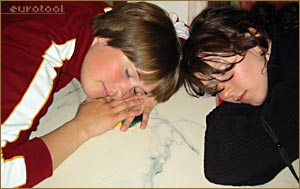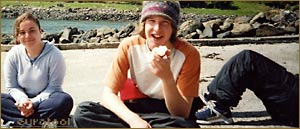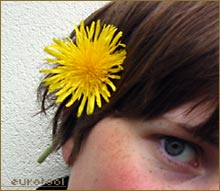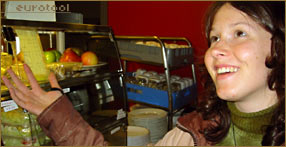Frequently Asked Questions
Contents |
General
I am over 25 years old… can I still participate in the program YOUTH?
Yes. There are different ways:
- As participant
- For Youth Encounters and Exchanges (Action 1), you can exceptionally be over 25 if your participation is justified and the number of people in the group aging over 25 is restricted. For EVS (Action 2), you can be over 25. For Youth initiatives (Action 3), participants should be aged between 15 and 25 “in principle”.
- As leader
- In a Youth Encounters and Exchanges (Action 1), each group should have one or more leaders (in accordance with national legislation or requirements for this type of activity). Their task is to be responsible for carrying out and monitoring the project properly and for ensuring the active involvement of all participants
- As Menthor
- In an EVS (Action 2) project, each host organization must identify a mentor who is directly responsible for the volunteer and to whom the volunteer can turn in case of problems.
- Other
- The different 9 Support Measures (Action 5) are open to: youth workers, trainers, support persons, project managers, mentors, youth leaders and other actors involved or interested in non- formal education.
What are the requirements to be an “organization”?
An organization must be a legally established Non-Governmental Non-Profit organization or association. It can work with any field as long as it is related with young people: social, environmental, multimedia, artistic, educational, etc.
Do I have to pay to join a project?
It depends on the Action.
- As participant
- Nothing for those Youth Encounters and Exchanges (Action 1) in which the hosting organization finances all the expenses of the participants (accommodation, transport and food).
- Nothing for all EVS projects (Action 2), since travel costs, insurance, food, accommodation and a small allowance are covered by the YOUTH program and the organization.
- A little for those Youth Encounters and Exchanges in which not all expenses are financed by the organization. In this case, participants usually have to pay a Participation Fee and a part of the ticket (for example, 70 Euros for the Participation Fee and 30% of the ticket).
- A part for a Group Initiative, Networking Projects and Future Capital (Action 3). For these programs you get a grant from the Program depending on 1) the priority they give to your project, 2) the proposal of expenses you wrote in the application. This money is not usually enough to cover all your expenses, so in most cases you will have to search for a part-time job. Check the User's Guide for the exact amounts determined for Group Initiatives, Networking Projects and Future Capital.
- As organiser
- Part of all costs if no other contribution is found: the Program grant is based on the principle of co-funding with other public and/or private contributions, the total project cost cannot be covered by YOUTH alone. Check the User's Guide to see what exactly is financed by the Program for Youth Encounters and Exchanges (Action 1), EVS (Action 3), and Support Measures.
For more detailed information, check the Youth in Action Programme Guideother languages.
Can I apply for a project from a country different that mine? (For example, in the case that I’m a Greek citizen living in England and I would like to apply for an EVS project in Sweden through an organization from the UK.)
Yes. Then your application is done through the National Agency of the country of the organization.
Are only EU contries participating in the Program YOUTH?
No.
Countries which can participate in all five actions of the YOUTH program are called "Program countries". These are the 15 member states, the 3 EFTA countries members of the EEA, and the 12 countries candidates to access the European Union. See list.
The countries in other parts of the world ("third countries") which can participate in Actions 1, 2 and 5 of the YOUTH program are divided into priority regions. See list.
Action 1
What is NOT a Youth for Europe Exchange?
A Youth Exchange is NOT to go to France with six friends for ten days as a holiday. It is NOT to make a program to meet our friends from last year and whoever they bring with them. It is NOT to go on whatever project because you get accommodation and tickets for free.
According to the Youth in Action Programme Guideother languages, the following activities are not eligible for grants under the YOUTH program: statutory meetings of organizations, holiday travel, language courses, school class exchanges, academic study trips, performance tours, competitions, exchange activities which can be classed as tourism, exchange activities which aim to make financial profit.
Can I choose whatever subject I want?
Yes. As long as the subject is related with youth and the participants get completely involved in it and explore it together.
The chosen theme should also be present in the daily activities of the exchange. Examples of themes are music, films, local heritage, environment, information technology, racism, xenophobia and drug abuse.
Can I apply for a Youth exchange for two months?
No. The established time for a Youth Exchange is between 6 and 21 days, excluded travel and preparation time.
How is the grant calculated?
The YOUTH program covers a portion of the cost of the exchange. Basically you get 70% of the actual travel costs, a fixed amount for preparation and program activities, and a fixed rate per day/per participant. The grant for preparation can include a planning visit to the host country for one or two persons.
What's the difference between project dates and activity dates?
The project dates include the process from preparation to evaluation. The activity dates are the days of the actual exchange visit (days of hosting or traveling). Any costs incurring before the project starting date cannot be covered by the YOUTH program.
Why have youth exchanges?
Exchanges are intended to contribute to the personal development of the young participants. The exchanges are open to all British young people, regardless of their background, education, or socio-economic situation.
What is a youth exchange?
A youth exchange brings together groups of young people from different backgrounds from two, or several countries, providing them with an opportunity to meet, discuss and confront various themes, whilst learning about each other's countries and cultures.
Who can participate?
Groups of young people aged between 15 to 25 (in some cases 13 to 30) years of age, who are legally resident in a country are eligible to participate in the program.
Who are the partners in a youth exchange?
Each youth exchange has a host group and one or a number of sending groups. The first step is to form a group, which will develop the project idea. The second step is to identify partners for the future exchange.
What are the general project criteria?
Group size and Duration: A minimum total of 16 and not more than 60 participants. Partners must be balanced in terms of their number of participants. Duration is from 6 to 21 days, excluding travel.
Group leaders: Each group should nominate group leaders. The leadership team's task is to oversee the smooth running of the project.
What are multilateral exchanges?
They involve groups of young people from at least three program countries. The exchange must take place in one of the countries involved in the project. For multilateral exchanges involving at least four program countries, the host organization applies, on behalf of all the partners for all costs, to their National Agency.
There are also other types of activities which the European Commission will consider on a case-by-case basis, such as: Itinerant multilateral exchanges, when the entire exchange group moves during the activity from one country to another.
How is a project financed?
The grant is calculated on the basis of real costs for travel and fixed rates for all related costs. The exact amounts are detailed in the application forms.
Where is the European dimension?
The impact of a youth exchange should also bring the concept of "Europe" to the local community, and raise and promote a more positive awareness of other cultures.
Action 2
What is NOT an EVS project?
Short term EVS is NOT voluntary tourism for one month with all paid. It is NOT two months with all paid. It is NOT a program for all kind of young people.
Long term EVS is NOT working in Austria for one year. It is NOT studying Spanish in Spain for ten months. It is NOT six months break in Crete, all paid. It is NOT to get a volunteer worker to substitute a normal worker.
Who can become a volunteer?
All youngsters between 18-30 years from one of the program countries can become a volunteer. There is no special knowledge craved in advance.
How long is the duration of voluntary service?
The Service lasts a minimum of 2 weeks and a maximum of 12 months. Volunteers that did a service shorter than 2 months (short-term EVS) are allowed to do another long-term EVS (up to 12 months).
How can I apply to become a volunteer?
When you have a sending organization and you find a hosting organization you want to go to, you do the applications together.
What is a sending organization?
Your sending organization helps you with applications, follow-up and contact with the host organization you will go to.
What can I do if I don't have a sending organization?
The first thing you can do is to think if you have any organization which you are connected with in any way. Maybe you have a spare-time activity, a sports team etc.? One tip is to get in touch with your municipality and ask them to be your sending organization. Another is to contact an already active sending organization.
What can I do as a volunteer?
There are projects within a lot of different subjects. You can help homeless, children and old people, or join in restoring old houses, cleaning in the nature, work with theater etc. You can see the different projects and the fields they work within in organizations.
Do I have to know the language of the country I go?
No, normally it is not required any knowledge of the language. But this depends on the kind project you go to and what type of work you will do. The host organization receives an amount of money to organize language courses for you.
As an organization, what do I exactly have to pay for my volunteers?
Apart from giving them personal support, organizations are responsible for: language training, volunteer's accommodation and food, and local transport.
The international travel, insurance, visa, vaccination, and pocket money are given by the Program.
Do I have to pay anything as a Volunteer?
No. From the YOUTH program the sending organization applies for a grant to support your travel and preparation, and the host organization applies for grant to support you with food, a place to stay, mentoring, language courses, local transport and pocket money. Since the costs of hosting a volunteer often are more that the grant applied for, the organization may have to find co-financing, which is something to have in mind when you go to an organization. As a volunteer you have the right to receive pocket money (a fixed amount depending on which country you go to) every week or month.
How long time does it take before I can start?
When you have found your sending organization you have to find a host organization, and it's very different how long time this takes. You can have luck and be accepted by the first organization you contact, but you might also have to contact several organizations before everything is ready. When you have both the sending and host organization you do the applications together. There are five application deadlines per year, and you will know the result approximately two month after the relevant deadline of your application. Read more about the application deadlines here.
If I don't like the project, can I change it as often as I want?
Not really.
You can change your project just if you have really serious problems with it. To change, you must first discuss it with your organization and the National Agency. The National Agency will then be the responsible to try to find you a place in another project If there are free places in any.
Action 3
What is NOT a Youth Initiative project?
A Youth Initiative is NOT to ask support to a make a book and then print just ten copies and keep the rest of the money because nobody will check it.
A Group Initiative does NOT involve young people’s transnational mobility. Therefore, international travel expenses cannot, in principle, be included in the project budget.
In what countries can I do my future capital? Must I choose between my hosting and sending country?
You can do your future capital in any of the program countries, even if you have no relation with the country at all. You just have to send your application to the National Agency of the country you want to apply to.
If I want to do my future capital in another country, do I have to produce some material in the language of that country? Must it at least be in English or any other language then?
There are no specifications about this in the Youth in Action Programme Guideother languages, but it is a good idea to think in this direction if you want to get your project approved.
On the one hand, the activities should be in a language that the people to whom they are focused will understand. On the other hand, think also about the languages that the members of the National Agency speak, because it is them who will check the project (it is not a good idea to ask the N.A. of Poland to check your website just in French, for example).
Can I do my Future Capital even if I didn't make my EVS?
No. You must do EVS before.
What do I need to make a networking project?
A group of at least 4 young people, aged between 15 and 25 (in principle), and legally residents in one of the Program Countries. It can last between three months and one year and must take place in a program country. For detailed information, check the Youth in Action Programme Guideother languages.
Action 4
People of all ages can take part in a Joint Action project?
The program includes young people between 15 and 25 years old, and adults such as youth leaders, youth workers and project managers of the youth field.
Do I have to pay to take part in the project?
It depends. Every year there are calls for proposals published in the Official Journal of the European Communities. There they indicate also the support and budget available, and the financial conditions.
What's basically the difference between the programs SOCRATES, LEONARDO DA VINCI and YOUTH?
SOCRATES has educational programs, LEONARDO DA VINCI has vocational training programs, while YOUTH has programs within non-formal education.
Action 5
Who can apply?
Local, regional or national organizations, and groups from the statutory and voluntary youth sectors, interested in developing projects within the objectives of the YOUTH program.
European youth organizations which have a base in one of the program countries, along with member branches in at least 8 program countries, can apply either through their National Agency, or direct to the European Commission in response to a specific call for projects twice a year.
Most projects should involve a minimum of four countries.
Do I have to be experienced within youth activities to do a Support Measure project?
Not necessarily, it also includes young people and other actors involved or interested in non-formal education.
Can I choose whatever subject I want?
There are many different subjects and type of activities within the Support Measure program, but all projects must be directly linked to the Actions and/or objectives of the YOUTH program.
What kind of activities can be organized?
Activities fulfilling one or more of the objectives described, can take a variety of forms such as training courses, visits, workshops, seminars or job shadowing. The choice will depend upon the most appropriate method to achieve the objectives of a particular project.
How long does a Support Measure project take?
This depends on which of the nine types of activities you take part in. Read about the activities 1-9 here!
How are projects financed?
Grants are based on the principle of co-funding. This means that the YOUTH program and the organizers/participants contribute to the cost of a project. The contributions of the organizers/participants can be in cash, or in-kind, or a combination of both. All Support Measures must be non-profit-making.
Who should submit the application?
For support measures with program countries, applications are submitted to the National Agency in the country either where the project will take place, or where it is being coordinated.
Who can participate?
Projects can involve youth workers; trainers; support persons such as Youth Initiative assessors, European Voluntary Service supervisors and mentors; youth officers, managers and policy makers – indeed all who are involved in informal education.
Participants can be from any of the countries participating in the program.




